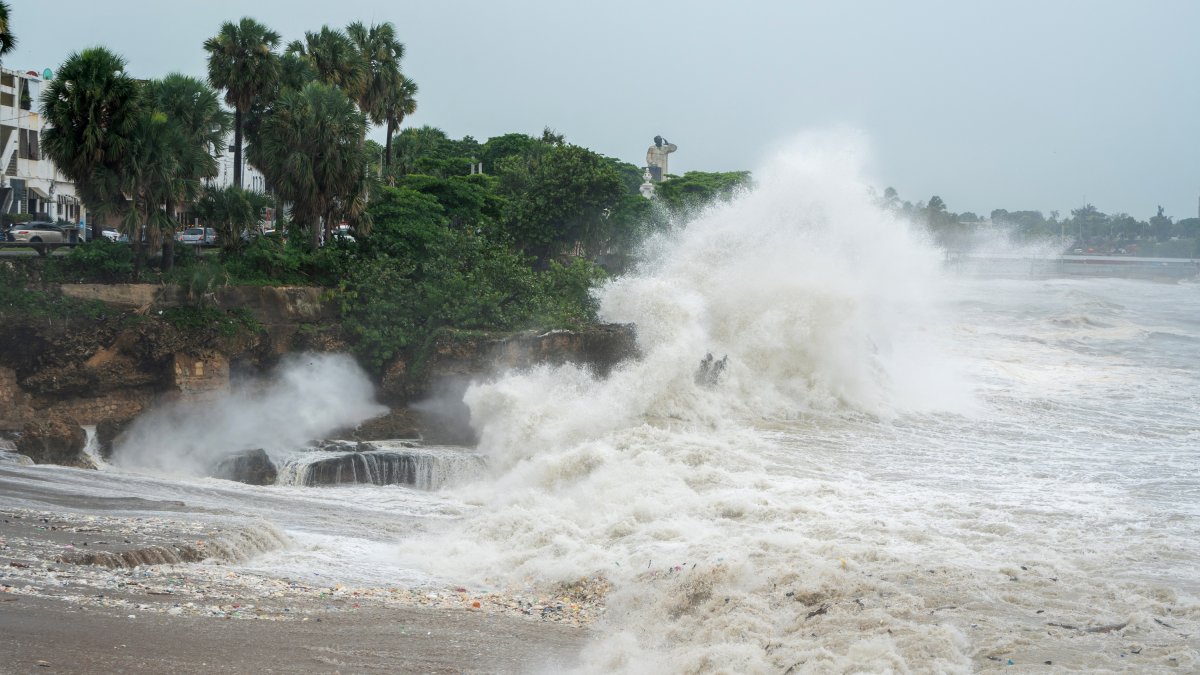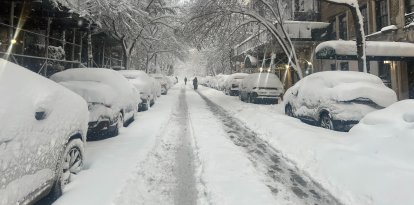Hurricane Beryl leaves at least seven dead in the Caribbean as it continues on its path towards Jamaica
Authorities said that, due to the weather phenomenon, three people died in Grenada, another in St. Vincent and the Grenadines and three more in Venezuela.

Image of high tides after Hurricane Beryl passed over Santo Domingo on July 2, 2024.
Hurricane Beryl weakened slightly on Tuesday to category 4, the second highest, it is now heading towards Jamaica with forecasters warning of potentially deadly storms and high winds after causing at least seven deaths in the Caribbean and widespread destruction in the southeastern part of the region.
According to reports from authorities, the phenomenon left at least three dead in Grenada, one in St. Vincent and the Grenadines and three in Venezuela.
The National Hurricane Center (NHC) indicated in its latest report (released at 9 a.m. GMT) that it expected Beryl to "weaken" as it arrives off the coast of Jamaica on Wednesday, but warned that it will batter the island as a "near-major" storm with potentially deadly winds, storm surge, rainfall and flash flooding.
According to the NHC, there is a hurricane warning for Jamaica, which is preparing with emergency shelters in Montego Bay and secure facilities in Kingston, according to the Jamaica Gleaner.
"I urge all Jamaicans to stock up on food, batteries, candles and water. Get your important documents safe and remove any trees or items that may endanger your property," Prime Minister Andrew Holness said on X.
The NHC further forecast surges along the southern coasts of Puerto Rico and Hispaniola, where the Dominican Republic and Haiti are located.
Widespread destruction
However, in other areas of the Caribbean the damage was already done.
After losing some intensity over the weekend, Beryl strengthened again on Monday reaching maximum category on the Saffir-Simpson scale as it reached Grenada's Carriacou Island, population 9,000.
"Within half an hour, Carriacou was devastated," Grenada's prime minister, Dickon Mitchell, sentenced. "We've had virtually no communication with Carriacou for 12 hours," he said.
Under a state of emergency, Carriacou had telecommunications and electricity cut off, with homes and fuel supply posts razed. Two people died there and a third died on the main island of Grenada, when a tree fell on a house.
In Venezuela, President Nicolas Maduro took stock of Beryl's damage on the country's northeast coast.
"At this hour three people are confirmed dead, two men and one woman (...) there are four people missing, two men, two women. They are in search efforts," said Maduro. He also reported that there are 80 families in shelters and some 1,800 houses affected.
Venezuelan Vice President Delcy Rodriguez injured after a tree fell on her
St. Vincent and the Grenadines also suffered "catastrophic winds and potentially deadly storm surges" leaving destruction, desolation and at least one death, according to the prime minister, Ralph Gonsalves, who said "there could be more victims."
In Dominican Republic, huge waves crashed against the coast along Santo Domingo from the storm's passage south of the country, AFP photographers reported.
A meeting of the Caribbean regional bloc Caricom scheduled this week in Grenada was postponed.
The NHC urged the Cayman Islands and several areas of the Yucatan Peninsula and the Gulf of Mexico to take extreme measures in the face of Beryl's advance.
Barbados, the easternmost of the Windward Islands, was spared the worst and only recorded strong winds and torrential rains. Flooded houses and damaged fishing boats in Bridgetown, although no injuries were reported.
Already on the French island of Martinique, there is a tropical storm warning and some 10,000 homes were without power in different areas.
An unusual cyclone
Beryl is the first hurricane of the 2024 Atlantic season, which runs from early June to late November.
Experts say it is unusual for such a powerful cyclone to form so early in the season.
"Only five major hurricanes (Category 3+) have been recorded in the Atlantic before the first week of July," expert Michael Lowry specified on the X network.
The National Oceanic and Atmospheric Administration (NOAA) also predicted in late May an extraordinary season, with the possibility of four to seven Category 3 or more hurricanes.
Warm ocean temperatures are key for hurricanes, and North Atlantic waters are currently 1-3 degrees Celsius warmer than normal, according to NOAA.
The director general of lthe World Health Organization (WHO), Tedros Adhanom Ghebreyesus, expressed concern for the region and through a message on X said the entity "stands ready to support national authorities in any health needs."
























